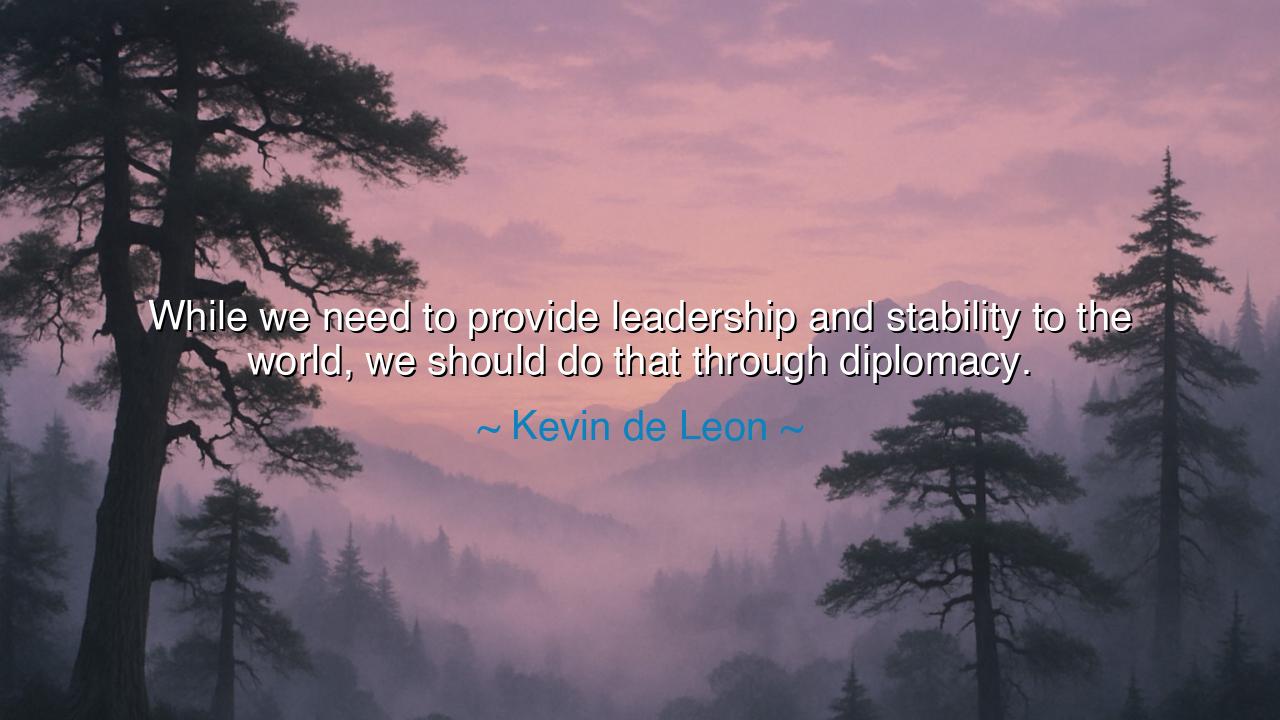
While we need to provide leadership and stability to the world
While we need to provide leadership and stability to the world, we should do that through diplomacy.






When Kevin de León, the American politician and former President pro tempore of the California State Senate, declared, “While we need to provide leadership and stability to the world, we should do that through diplomacy,” he was speaking as one who had seen both the power and the peril of leadership. In his words, there is the echo of an ancient wisdom: that true strength does not roar—it persuades; that the greatest leaders are not conquerors of nations, but builders of peace. His message is not only for statesmen, but for all who seek to guide others: leadership without diplomacy breeds conflict, but diplomacy transforms power into harmony.
The origin of this quote lies in de León’s lifelong commitment to public service, where he often stood at the crossroads of policy, community, and conscience. Having risen from humble beginnings to one of California’s most influential political figures, he understood that leadership is not a contest of dominance but of responsibility. When he spoke these words, he was addressing the role of America—and, by extension, every great power—in the world. His belief was that global stability cannot be maintained by force alone. It must rest upon dialogue, cooperation, and understanding—the pillars of diplomacy that sustain peace when weapons and pride fail.
To provide leadership and stability is the desire of every strong nation and every wise leader. Yet, history has shown that when power is not tempered by humility, it becomes destruction in disguise. The ancients knew this truth well. The Roman general Scipio Africanus, after defeating Carthage, treated his enemies with compassion and restraint, choosing diplomacy over vengeance. His mercy, more than his military genius, secured peace for a generation. In contrast, when leaders have sought dominance through conquest alone, as did Napoleon after his victories, the result has always been the same—glory that burns brightly but quickly consumes itself. Thus, de León’s words remind us that lasting leadership is not the art of intimidation, but of reconciliation.
“We should do that through diplomacy,” he says—words that seem simple, yet contain a profound philosophy. Diplomacy is not weakness; it is the highest form of strength. It is the mastery of patience over impulse, persuasion over coercion, and understanding over anger. It is the art of turning enemies into allies, of transforming chaos into cooperation. In every age, those who have practiced diplomacy have proven that peace built through words endures longer than peace enforced by swords. Consider Mahatma Gandhi, whose diplomacy was spiritual rather than political. Without armies or violence, he bent the British Empire through moral persuasion and steadfast resolve. His leadership was living proof that diplomacy, rooted in justice and compassion, can reshape the world more powerfully than any empire ever could.
There is also a moral law hidden within de León’s insight—one that applies not only to nations but to individuals. Each person, in their own sphere of life, wields a kind of power—over families, workplaces, or communities. The temptation to impose will through force or authority is universal. But the wise understand that stability born of fear is fragile, while harmony born of respect endures. The leader who listens before commanding, who seeks understanding before judgment, becomes a diplomat of the human spirit. In this sense, diplomacy is not merely a strategy of foreign policy; it is a way of life, a reflection of the highest order of character.
Yet, diplomacy requires courage—the courage to face hostility without surrendering to it, to hold firm in principle while extending a hand of peace. It demands restraint, humility, and wisdom, the very qualities that separate the wise from the proud. This is why de León speaks of leadership through diplomacy as a necessity, not an option. A world without it descends into endless cycles of retaliation and ruin. But when guided by diplomacy, leadership becomes a light—a stabilizing force that nurtures hope even in divided times.
Let the lesson of Kevin de León’s words be carried to every heart that would lead: to command is easy, but to reconcile is divine. The sword may silence a voice, but only dialogue can heal the heart. Whether you lead nations or families, communities or friendships, learn to govern through empathy, patience, and principle. Seek peace not through the absence of struggle, but through the presence of understanding. For leadership that endures is born not of fear, but of faith—faith in the power of human reason, and in the quiet, indestructible force of diplomacy.
Thus, in the spirit of de León’s wisdom, remember this eternal truth: Leadership finds its nobility not in conquest, but in compassion; not in dominance, but in diplomacy. The world has known many conquerors, but few peacemakers—and it is the peacemakers who have shaped the destiny of humankind. So, strive always to lead as they did—with courage enough to listen, and strength enough to build peace. For only then can we bring true stability to the world, and leave behind not ruins of power, but a legacy of harmony.






AAdministratorAdministrator
Welcome, honored guests. Please leave a comment, we will respond soon